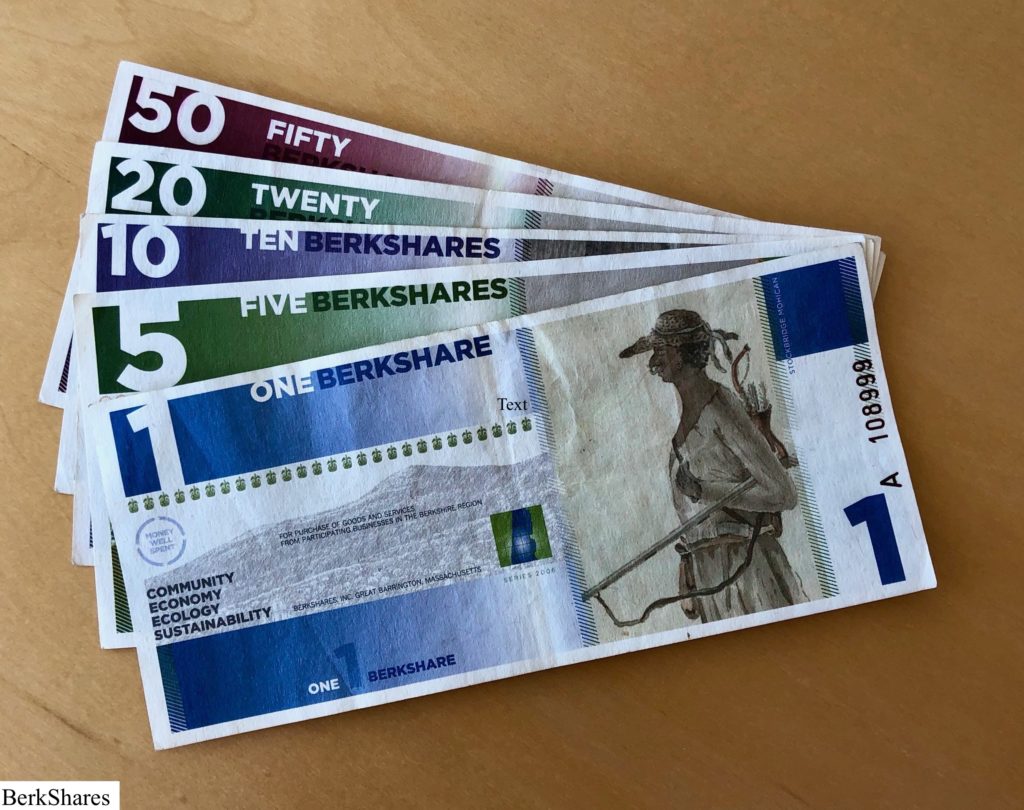UMass Students Publish New “Massachusetts Catalog of Commoning,” Profiling BerkShares, Mass Mesh, Kestrel Land Trust, and More

BerkShares, an alternative local currency used in the Berkshires region. Photo: umass.edu
Source: UMass News and Media
Throughout Massachusetts, people are coming together to protect vital resources and, in the process, they are building institutions and strengthening communities through commons organizations. Now, for the first time, a multi-disciplinary team of graduate and undergraduate students from the University of Massachusetts Amherst have taken an inventory of such efforts and have published a digital magazine detailing the histories and benefits of 11 commons initiatives in the Bay State.
The “Massachusetts Catalog of Commoning,” now available for free download online, highlights and showcases commoning efforts in Massachusetts. The 38-page publication was co-edited by Charlie Schweik, professor of environmental conservation and public policy at UMass Amherst, and Maxine Gunther-Segal, a student at Smith College, and the case studies were researched and written by 11 graduate and two undergraduate students at UMass Amherst.
“Commons can be natural resources like land, built resources like homes or businesses, or less tangible resources like money or time,” explains Gretchen Siegchrist, a master’s student in sustainability science who wrote the magazine’s introduction and the case study of Mass Mesh, a Boston-based tech commons whose goal is to make the internet affordable and secure while also turning each of the people who are connected into an actual participant in the network. “Commoning initiatives can be structured as nonprofits, cooperatives (co-ops), collaborative efforts supported by government programs, or citizen-led self-governed initiatives.”
What all of the organizations profiled in the magazine share, Siegchrist says, is “the spirit of commoning behind them—people working together to create and manage something from which they can all benefit.”
In addition to Mass Mesh, the “Massachusetts Catalog of Commoning” provides case studies of North Amherst’s Simple Gifts Farm and Pioneer Valley Cohousing; Springfield’s Wellspring Cooperative Corporation; Ashfield’s Double Edge Theatre; the Pioneer Valley’s Kestrel Land Trust; Berkshire County’s BerkShares and the Pioneer Valley’s Valley Time Trade local currencies; and Greenfield’s Hive, Orange’s LaunchSpace, and Make-It Springfield makerspaces.
Siegchrist describes commons as “opportunities—to take control of resources; provision what we need, especially things not provided by the market; create more affordable, equitable, and sustainable institutions; and build stronger communities. Their shared management is rooted in the idea that resource use and care can be a collaborative community endeavor. Commoning activities provide social and environmental co-benefits: housing, within a strong community; Wi-Fi, that is affordable and secure; currency, that supports local businesses; and makerspaces, where things can be locally made or repaired, and where community and peer-to-peer learning are cultivated.”
Each article provides the subject’s history and features interviews from their founders, creators, developers, directors, administrators, or stewards. Joining Siegchrist in authoring the case studies were Trevor Campbell, Kathrine Esten, Maddy Leue, Bradley Riley, and David Wasielewski, master’s students in public policy; Nathalie Irmer, a master’s student in regional planning; Erica Light, Hannah McDonald, and Alexia Perides, master’s students in sustainability science; Samantha Myers, a master’s student in environmental conservation; and undergraduate students Lam Tran and Kyle Webb.
“The commons cases listed in this catalog are just a few of many in Massachusetts,” Siegchrist says. “They come in all shapes, sizes and structures. Some have existed for decades, while others are just getting started.”
“Our idea is that this will be the first release of many,” Schweik says of the catalog. He hopes that the ‘Massachusetts Catalog of Commoning’ will “become a living document of sorts, highlighting and showcasing commoning efforts in Massachusetts, with each future volume updating existing stories and adding new stories.”
“My hope is also that this will be a model for other states to replicate,” Schweik says. “I’m hoping to build a network of university researchers around the world to have their students do similar projects, and ultimately building a database of commoning worldwide. I find that these kinds of stories give hope to our students looking at the problems the world faces, such as environmental degradation, low paying jobs with no benefits and a loss of community and social capital. These stories exemplify the incredible energy and innovation that people in the Commonwealth are tapping into to address societal problems we face.”
The “Massachusetts Catalog of Commoning” is available online now from Schweik’s ScholarWorks site.
